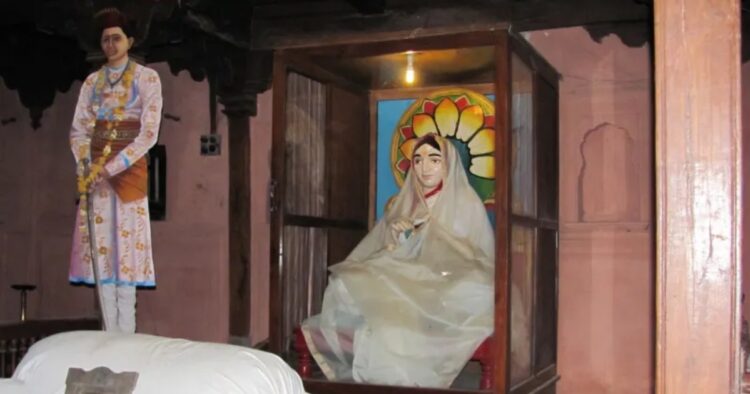KEY POINTS
- Ahilyabai Holkar rose to power after the deaths of her husband, father-in-law, and son.
- She uncovered a secret conspiracy and strategically secured political and military support.
- Faced with her leadership, even the Peshwa ordered rivals to retreat, granting her the throne.
When we think of great women in Indian history, names like Rani Lakshmibai of Jhansi, Razia Sultana of the Delhi Sultanate, and Rani Durgavati of Gondwana often come to mind. But there is another powerful and wise queen whose story remains less told, Ahilyabai Holkar, the revered queen of the Malwa kingdom in the 18th century.
Ahilyabai’s journey to the throne was not written by birthright or passed down as inheritance. She rose to power through strength, resilience, and strategy — at a time when women rulers were almost unheard of. Her story is not just about royalty but about a woman who challenged patriarchy and politics to lead one of the most significant regions in Maratha India.
Humble Beginnings and Unexpected Destiny
Ahilyabai was not born into a royal family. She came from a simple village in Maharashtra. But fate had something bigger in store. In 1733, at a young age, she was married to Khanderao Holkar, son of Malhar Rao Holkar, one of the most trusted generals of the Maratha Empire under Peshwa Baji Rao.
It was Malhar Rao Holkar who first recognized her intelligence, discipline, and potential. He became her mentor and strongest supporter. In 1732, he was granted charge of the Malwa region by the Peshwas, and Indore was established as the power center.
Tragedy struck Ahilyabai early and repeatedly. Her husband Khanderao was killed in battle in 1754. Then, in 1766, her guiding light and father-in-law, Malhar Rao Holkar, also passed away. Only months later, her only son Malerao died, leaving Ahilyabai alone, grieving, and sitting at the heart of a crumbling dynasty.
It was at this vulnerable time that betrayal began to take root. Her manager, Gangobatatya, saw her sorrow as a chance to rise in power. He secretly joined hands with Raghobadada, the uncle of the then-ruling Peshwa Madhavrao. Raghobadada had his eyes on Malwa and believed that with the Holkars weakened, it was the perfect time to seize control.
Ahilyabai’s Sharp Response: Strategy Over Fear
But Ahilyabai was no ordinary widow. Even in her grief, she remained alert and informed. She had already built a network of informants, and news of the conspiracy reached her before it turned into an invasion.
Her first decisive action was to appoint her most trusted commander, Tukoji Rao Holkar, to lead her army. But she didn’t only prepare for war. She turned to diplomacy and politics, showing her strength not just on the battlefield but in statecraft.
Ahilyabai wrote directly to Peshwa Madhavrao, explaining the situation and requesting official recognition to rule in her own name. At the same time, she contacted major Maratha leaders and secured their political and military support. She was building her case, step by step.
As Raghobadada’s forces began moving towards Maheshwar, the new capital Ahilyabai had established, he was intercepted. Not by an army, but by a letter — from the queen herself.
This letter was not a plea. It was a challenge. Ahilyabai made it clear that defeating a grieving woman would bring no honor, but losing to her would forever damage Raghobadada’s reputation.
Still, he marched on, but what he found at Ujjain changed everything.
Instead of a frightened widow, Raghobadada saw Ahilyabai leading a massive and majestic procession. She was surrounded by her army, elephants, commanders, and most importantly, the people of Malwa, all standing beside her.
The citizens weren’t there out of fear. They were inspired by love and respect. Her leadership had earned her the loyalty of the people and the soldiers alike.
When Madhavrao Peshwa learned of this show of strength and unity, he did not support his uncle’s ambitions. Instead, he ordered Raghobadada to retreat.
This was the moment Ahilyabai Holkar truly claimed her right to rule.
Legacy of a Just and Noble Queen
Ahilyabai didn’t just hold onto power, she transformed Malwa. She shifted the capital from Indore to Maheshwar, turning it into a center of art, culture, education, and justice.
Her rule is remembered as one of peace, prosperity, and fairness. She built temples, dharamshalas, wells, and roads across India — not just in her kingdom. Her charitable work extended from the banks of the Narmada to the ghats of Kashi.
Ahilyabai Holkar’s story is not just about royalty. It is about resilience in sorrow, strength in strategy, and grace in governance. At a time when women were sidelined in politics, she not only stood her ground but redefined what leadership meant.
She may not always be mentioned alongside the most famous rulers, but her story is a reminder that true power lies not in titles, but in actions, vision, and courage.

















Comments